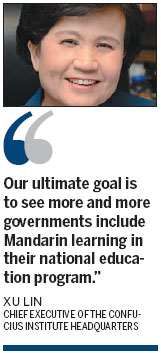Global dreams for Confucius
Updated: 2012-12-18 07:56
By Cheng Yingqi (China Daily)
|
||||||||
|
Artists from Shanxi Art College perform at the opening ceremony of the Seventh Confucius Institute Conference in Beijing on Sunday. Provided to China Daily |

Institutes carry on work of great teacher and sage
About 2,500 years ago, Chinese teacher and philosopher Confucius traveled through various states to spread his ideas. His efforts didn't get immediate results, but his students carried forward his ideas and made them influence Chinese people to the present day.
Now Confucius' influence is growing even more overseas.
From Sunday to Tuesday, more than 2,000 university presidents from 108 countries are gathering in Beijing to work out a bigger picture for the development of Confucius Institutes across the globe.
The Confucius Institutes are non-profit public institutions jointly established by universities and Hanban (also known as the China National Office for Teaching Chinese as a Foreign Language) to promote the Chinese language and culture and support local Chinese teaching internationally.
After eight years of development, more than 400 Confucius Institutes have been established in 108 countries and regions, and 500 Confucius Classrooms opened to teach pre-university students.
Despite the fast growth, Xu Lin, director-general of Hanban and chief executive of the Confucius Institute Headquarters, said there is still "a long way to go" for the Confucius Institutes to integrate into host universities and communities.
"We should actively provide services, and try our best to better integrate into host universities and communities," Xu said in an interview ahead of the Seventh Confucius Institute Conference in Beijing.
Xu raised four major objectives that Hanban plans to achieve by 2020 to help with the integration of Confucius Institutes into host universities and communities.
"First, for the long-term development of Confucius Institutes, we are fostering our main teachers," she said.
Currently, most directors and teachers at the institutions are not tenured professors at the university.
"Especially the directors we sent from China, most of them were college deans before being selected as Confucius Institutes directors. And once they finish their terms at the Confucius Institutes and return home, they break their connections with Confucius Institutes, and they may not have any contact with the Confucius Institutes in their future lives," Xu said.
This year, Hanban and some Chinese universities selected 300 full-time teachers for Confucius Institutes as the backbone of the sustainable development of Confucius Institutes.
"Like diplomats, these teachers will be going outside China constantly, so our Confucius Institutes will finally have a more complete structure," Xu said.
According to Xu, Alliance Francaise, an international organization that promotes the French language and culture around the world, has 12,000 full-time teachers.
The Goethe-Institut, a non-profit German cultural association operating worldwide, has more than 2,000.
In November, Hanban launched a new project named the Confucius China Study Plan. The project supports foreign students seeking to complete PhD programs in designated academic areas of the humanities and social sciences in China, and sponsors experts and outstanding students for short-term exchanges.
"We plan to attract young experts in literature, history and philosophy in other countries to have more interests in Confucius Institutes," Xu said. For example, if the experts can teach some courses in Confucius Institutes after their exchange in China, they can give some credits to students at the Confucius Institutes.
"As a result, the Confucius Institutes will have a closer connection with the host universities, and will become an important part of the universities," Xu added.
"Our ultimate goal is to see more and more governments include Mandarin learning in their national education programs."
Kent Deng, associate director of the Confucius Institute for Business London, said that the biggest difficulty the Confucius Institutes are facing is that in Western countries, colleges only recognize courses given by their own faculty.
"The students spend money and time to study in Confucius Institutes, and if they can get credits for the lessons at the same time, they will have a higher incentive to learn," he added.
chengyingqi@chinadaily.com.cn
(China Daily 12/18/2012 page3)

 Relief reaches isolated village
Relief reaches isolated village
 Rainfall poses new threats to quake-hit region
Rainfall poses new threats to quake-hit region
 Funerals begin for Boston bombing victims
Funerals begin for Boston bombing victims
 Quake takeaway from China's Air Force
Quake takeaway from China's Air Force
 Obama celebrates young inventors at science fair
Obama celebrates young inventors at science fair
 Earth Day marked around the world
Earth Day marked around the world
 Volunteer team helping students find sense of normalcy
Volunteer team helping students find sense of normalcy
 Ethnic groups quick to join rescue efforts
Ethnic groups quick to join rescue efforts
Most Viewed
Editor's Picks

|

|

|

|

|

|
Today's Top News
Health new priority for quake zone
Xi meets US top military officer
Japan's boats driven out of Diaoyu
China mulls online shopping legislation
Bird flu death toll rises to 22
Putin appoints new ambassador to China
Japanese ships blocked from Diaoyu Islands
Inspired by Guan, more Chinese pick up golf
US Weekly

|

|







